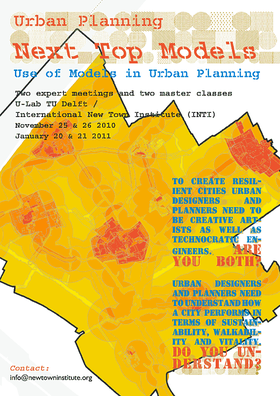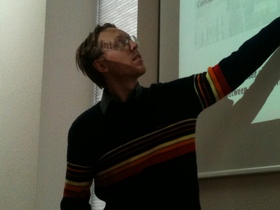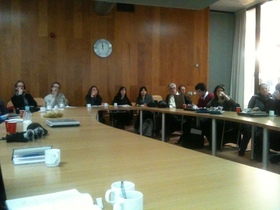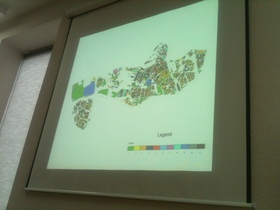Two expert meetings will be organized by U-LAB* and INTI** to expand your understanding of the city and help you to practice the art of urban design with more precision. New types of morphological research will be presented in which a more quantitative approach is taken. By measuring what you see, our intuition based knowledge becomes richer and innovative. Further, new technologies for data sampling, analysis and simulation models will be presented. Today these are merely used by non-designers although they could also make the design work more challenging and efficient. Pros and cons will be discussed during the presentation of different computer models used in practice today.
The central questions on these days will be: How can a quantitative approach and the use of analytical models such as Spacematrix enhance the understanding of urban form? How can this increase the power of the urban designer in the search for more sustainable urban futures? What computer models exist, or are being developed, that can assist urban designers in their practice? The recently published book ‘Spacematrix. Space, Density and Urban Form’ by Meta Berghauser Pont and Per Haupt will be used as a starting point for these Expert Meetings and Master Classes.
Expert Meetings
Expert Meeting 20 January 2011
Measuring Urban Form, January 20 2011
The second Expert Meeting highlights current research in the field of urban morphology with a special focus on quantifying its characteristics and performances. Special attention will be given to the performance differences between ‘traditional’ cities and New Towns. Differences between a ‘traditional’ city such as Amsterdam and a New Town like Almere seem obvious, but do we really understand? How walkable is Almere in comparison to Amsterdam? How dense and mixed are the neighbourhoods? How does all this effect the vitality of local centres? By understanding the performance differences, urban designers and planners can get rid of their first intuitive judgment and can start being more involved with defining conditions under which specific qualities (positive and negative) are more likely to be realized.
Expert Meeting 20 January 2011: Measuring Urban Form, January 20, 2011
9:00 Coffee
9.30 Opening by prof. dr. Han Meyer, director of U-lab
9.45 Urbanism by numbers by prof. dr. Anne Vernez Moudon, University of Washington
10.45 Spacematrix. Space, Density and Urban Form by dr. Meta Berghauser Pont, TU Delft
11.30 Measuring the urban private-public interface, dr. Akkelies van Nes, TU Delft
12:15 PhD innovations: Birgit Hausleitner, TU Delft
12.30 Lunch break
13:30 Dimensions of the Sustainable City by dr. Teresa Marat-Mendes, Lisbon University (preliminary)
14.30 A causal model relating urban form with daily travel distance by Kees Maat, TNO Delft
15:15 PhD innovations: Joost van den Hoek, TU Delft
15.30 Panel discussion
16.30 Drinks
Master Class January 21 2011
The second Master Class is led by professor Anne Vernez Moudon from the University of Washington. She is director of the Urban Form Lab and pleas for a scientific, quantitative approach to urban form. She specialized in the performance differences for walking. The Master Class will focus on the methodology of quantitative spatial research and deal with issues such as how to deal with more than 900 environmental measures to be able to understand patterns of clustering among variables.
Registration Expert Meetings:
The Expert Meeting is open to researchers and professionals from the field of urban design and planning.
The participation fee is € 350,-. For Students there is a special fee of € 50,- per Expert Meeting. Register before January 10 2011 at info@newtowninstitute.org.
Registration Master Classes:
Those who wish to participate in one of the Master Classes should send a project description of his/her work and a motivation letter of maximum 500 words to M.Y.BerghauserPont@tudelft.nl. Accepted proposals will be invited to join the Expert Meetings as well, free of charge.
Location Expert Meetings and Master Classes:
TU Delft
Faculty of Architecture
Julianalaan 134
2628 BL, Delft
The Netherlands
Contact:
info@newtowninstitute.org
Expert Meeting 25 November 2010
Learning from Computer Models in Urban Planning, November 25 2010
The first Expert Meeting discusses computer models currently used in practice. The role these models can play in the work of an urban designer will be specifically addressed. Most of present design (and planning) support systems have been designed to deal with either very specific issues (e.g. traffic modeling, pollution), or are guided mainly to optimize the balance between (predominately) non-spatial issues such as program, investment and financial returns (economic and decision models). Further, most models cannot handle imprecise input and can thus only be used to evaluate urban designs afterwards. During the expert meeting these issues will be discussed in order to see whether more advanced computer models can become part of the urban design tool kit.
Expert Meeting 25 November 2010: Learning from Computer Models in Urban Planning, November 25 2010
9:00 Coffee
9.30 Opening by dr. Michelle Provoost, director of INTI
9.45 Measuring and Modeling Urban Form by dr. Meta Berghauser Pont, TU Delft
10.30 The Place Syntax Tool by dr. Alexander Ståhle, Spacescape AB, Stockholm
11.30 Metronamica by Jasper van Vliet, RIKS, Maastricht
12:15 PhD innovations: Bardia Masshoodi, TU Delft
12.30 Lunch break
13:30 Characterising urban form and density in land-use simulations by Eric Koomen, SPINlab, The Spatial Analysis and Modelling team, VU Amsterdam
14.30 DPL instrument by Jaap Kortman, IVAM-UvA Research and Consultancy on Sustainability, Amsterdam
15:15 PhD innovations: Dena Kasraian, TU Delft
15.30 Panel discussion
16.30 Drinks
Master Classes
Each Expert Meeting is combined with a Master Class which is open to PhD students, graduation students and professionals dealing with morphology and modeling.
Master Class November 26 2010
The first Master Class is led by Alexander Ståhle from Spacescape AB in Stockholm. This consultancy office has together with the Technical University in Stockholm (KTH) developed a tool named Place Syntax with which characteristics of a certain place (density, functions, etc) is returned to the accessibility formula used in Space Syntax. The Master Class will focus on the development of new tools or expand existing ones to enhance the understanding of the city.
Urban Planning Next Top Models
is organized by:
* ULab is a centre within the department of Urbanism at the faculty of Architecture in Delft. The aim of ULAB is to strengthen urban design as a technical scientific discipline by the development of methods, tools and instruments which produce the possibilities for a fruitful and effective approach of the design of urban patterns in contemporary urban and metropolitan developments.
** INTI engages in integrated, international and multi-disciplinary research on New Towns. Research is the main focus; all other activities, such as education, courses, workshops and public events are derived from that. The research aims at New Towns in the broadest sense, historically as well as geographically (from old town fortresses to future New Towns in Asia) and disciplinary (urban strategy, architecture, civil engineering, history, sociology, geography, economy and development studies).





